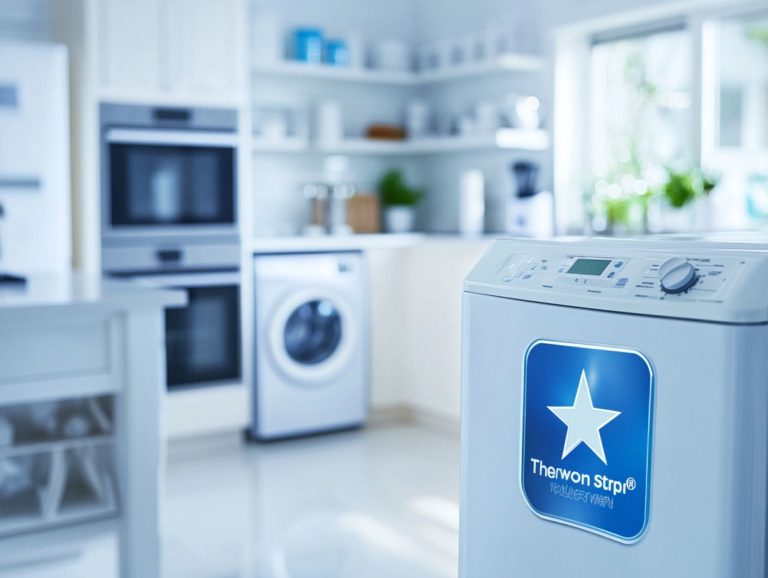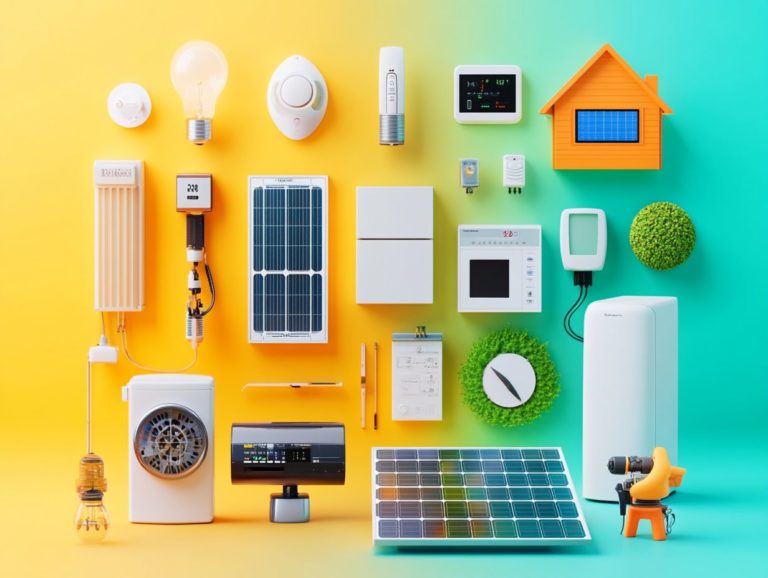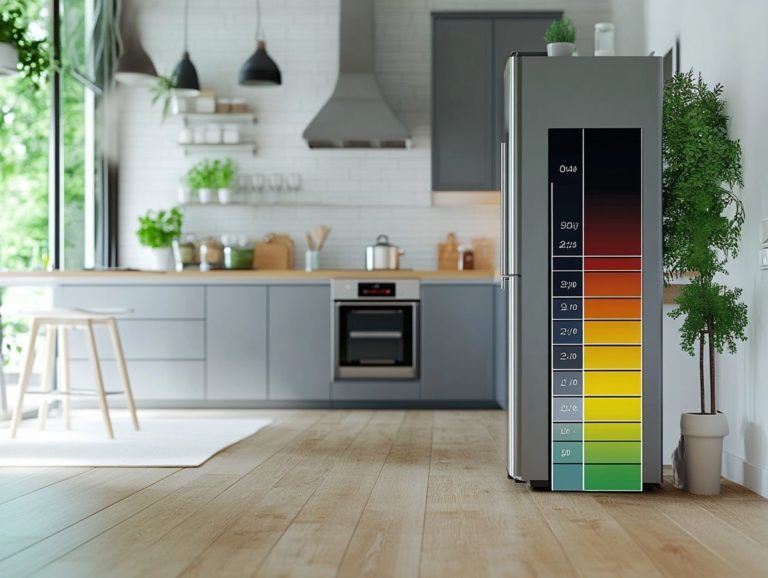Preparing Your Home for an Energy Audit
Curious about how to enhance your home s energy efficiency and trim those utility bills? An energy audit could be exactly what you re looking for!
This comprehensive guide takes you through the essentials of energy audits, highlighting their significance and the myriad benefits they provide.
From preparing for the audit to deciphering the results and making effective changes, you ll discover everything you need to turn your space into an energy-efficient sanctuary.
Join us as you explore practical steps to save money while also reducing your environmental footprint.
Contents
- Key Takeaways:
- What is an Energy Audit?
- Benefits of Conducting an Energy Audit
- Preparing for an Energy Audit
- Conducting an Energy Audit
- Interpreting Energy Audit Results
- Implementing Energy-Efficient Changes
- Maintaining Energy Efficiency
- Frequently Asked Questions
- What is an energy audit?
- Why should I prepare my home for an energy audit?
- How do I prepare my home for an energy audit?
- What should I expect during an energy audit?
- How can I make my home more energy-efficient after an energy audit?
- Are there any incentives for making energy-efficient improvements to my home?
Key Takeaways:

Understand the importance of an energy audit in identifying cost savings and reducing your environmental impact. Properly preparing for an energy audit by gathering necessary information can help make the process more efficient and accurate. Implementing cost-effective upgrades and maintaining long-term energy efficiency habits can lead to significant savings in the long run.
What is an Energy Audit?
An energy audit serves as a thorough evaluation of your home s energy consumption. It reveals opportunities to enhance energy efficiency, translating into significant cost savings and a smaller environmental footprint.
By conducting a home energy audit, you can gain insight into your energy usage patterns. You will identify inefficiencies like air leaks and insufficient insulation levels that contribute to energy loss.
With new tools like thermal imaging and blower door tests tests that help find air leaks in your home energy auditors can provide a detailed report. This report outlines specific upgrades and enhancements to guide you towards greater energy efficiency and renewable energy solutions.
Explanation and Importance
Understanding the importance of energy efficiency is essential for you as a homeowner aiming to reduce energy consumption and minimize those pesky utility bills.
By conducting energy audits, you can pinpoint where your home is losing valuable heat or cool air, enabling you to make informed choices about upgrades and improvements.
For example, sealing leaks around windows and doors or enhancing your insulation can lead to significant reductions in heating and cooling costs.
Energy audits may reveal old appliances. You can replace these with more energy-efficient models for greater savings.
This assessment optimizes your energy use and enhances your overall home comfort, creating a more enjoyable living space while contributing to sustainable energy practices.
Benefits of Conducting an Energy Audit
An energy audit can unlock incredible advantages for you as a homeowner! You’ll discover significant energy savings, experience improved comfort within your home, and uncover potential financial incentives for making energy-efficient upgrades.
Cost Savings and Environmental Impact
One of the most compelling reasons for you to conduct an energy audit is the substantial cost savings it can generate while simultaneously fostering sustainable living practices.
By pinpointing areas of inefficiency think outdated appliances, insufficient insulation, and pesky air leaks energy audits enable you to make informed choices that can significantly slash your monthly utility bills.
For example, upgrading your old HVAC system to an energy-efficient model not only reduces your electricity expenses but also unlocks funds for investments in renewable energy solutions, such as solar panels.
These proactive measures bolster your personal budget and contribute to a healthier environment, creating a win-win for both your household and the planet.
The cumulative impact of reducing energy consumption is crucial in combating climate change and promoting a wider embrace of green technologies.
Preparing for an Energy Audit

Preparing for an energy audit involves gathering essential information and documentation that will enable a comprehensive assessment of your home’s energy performance.
Taking the time to compile these materials ensures that the evaluation is both thorough and effective, ultimately leading to valuable insights about energy efficiency in your space.
Gathering Necessary Information
Gather your utility bills and home plans to get started! To effectively prepare for an energy audit, you need essential documentation. This will give auditors valuable insights into your energy usage patterns.
Having this important information allows for a thorough analysis of your monthly consumption rates. This can reveal any irregularities that signal inefficiencies. By reviewing your utility bills, you can identify trends in energy use over time, pinpoint peak consumption months, and assess the effectiveness of your current energy-saving measures.
Take a close look at your home construction plans. This helps reveal areas where energy loss might occur, such as gaps in insulation or poorly placed windows.
Together, these elements create a comprehensive overview. This enables auditors to provide tailored recommendations aimed at enhancing your energy efficiency and reducing costs.
Conducting an Energy Audit
Conducting an energy audit requires a meticulous evaluation of your home s energy consumption. It involves examining critical elements such as heating and cooling systems, insulation levels, and air leaks that lead to energy inefficiency.
By scrutinizing these factors, you can uncover opportunities for improvement and optimize your home s energy performance.
Step-by-Step Process
The process of conducting an energy audit unfolds systematically. It begins with a thorough examination of your heating and cooling system, insulation integrity, and air leaks driving up energy costs.
You ll walk through your property with the auditor, who will assess your current energy consumption patterns and gather data on your existing systems. This inspection often involves a close look at your heating and cooling system to ensure it’s running efficiently.
Next, the auditor inspects insulation, checking areas like attics and crawl spaces for gaps that might allow unwanted heat exchange. Specialized equipment identifies air leakage areas around windows, doors, and ductwork.
Each finding contributes to a comprehensive energy audit report, offering actionable insights that help enhance your overall energy efficiency.
Interpreting Energy Audit Results
Interpreting the results of an energy audit is crucial for homeowners. It helps you understand how your energy usage compares to efficiency ratings and identifies enhancements you can make by adopting energy-efficient models.
Understanding this data helps you make informed decisions that can lead to substantial savings and a more sustainable home.
Understanding Energy Efficiency Ratings

Energy efficiency ratings offer valuable insights into how well your home utilizes energy compared to similar residences. This information is crucial for making informed decisions based on your energy audit report.
These ratings may include various metrics, such as the Energy Star rating, which reveals how your home performs relative to others, or the HERS index, which quantifies energy consumption in terms of efficiency.
By looking into these details, you can identify areas for improvement. Whether it’s enhancing insulation, upgrading to more efficient appliances, or modernizing your heating and cooling systems, every action counts.
Understanding these ratings not only empowers you but also opens the door to potential savings on your energy bills while contributing to a more sustainable environment. Craft a more energy-efficient home that perfectly aligns with your unique needs!
Implementing Energy-Efficient Changes
Implementing energy-efficient changes informed by your energy audit can transform your home s comfort. Enjoy substantial cost savings in the long run!
Don t wait take charge of your energy efficiency today and watch your savings grow!
Cost-Effective Upgrades and Tips
When considering cost-effective upgrades, focus on energy-efficient appliances and enhancements that maximize your comfort while minimizing energy consumption.
Prioritize initiatives like installing smart meters. This provides real-time insights into your energy usage, enabling you to make informed decisions that further reduce your costs.
Improving your insulation helps maintain an ideal indoor temperature year-round and significantly lowers your heating and cooling bills.
Upgrading your lighting fixtures to energy-efficient LED options offers brighter illumination while using less electricity.
These upgrades lead to substantial energy savings and enhance your overall home comfort, creating a living environment that is both enjoyable and sustainable.
Maintaining Energy Efficiency
To maintain energy efficiency in your home, implement long-term strategies and cultivate energy-efficient habits that foster sustainable living.
By taking a thoughtful approach, you can create an environment that conserves energy and enhances your overall quality of life.
Long-Term Strategies and Habits
Adopting long-term strategies and energy-efficient habits is essential for homeowners like you who want to enjoy the lasting benefits of energy audits and upgrades.
Integrate regular energy monitoring with smart devices to gain insights into your consumption patterns and identify areas for potential savings.
Adjust your thermostat settings according to seasonal changes to save energy when you’re away or during peak hours.
Routine maintenance of your heating and cooling systems helps avoid costly repairs and ensures optimal performance.
This holistic approach enhances energy efficiency, lowers your utility bills, and contributes to a more sustainable environment.
Frequently Asked Questions

What is an energy audit?
An energy audit is a professional assessment of your home’s energy usage and efficiency. It identifies areas where energy is wasted and provides recommendations for improvements that can save you money on your energy bills.
Why should I prepare my home for an energy audit?
Preparing your home for an energy audit maximizes the effectiveness and accuracy of the assessment. It allows you to make necessary repairs or improvements beforehand, saving you time and money in the long run.
How do I prepare my home for an energy audit?
Start by making a list of specific concerns or areas of your home for the auditor to focus on. Gather your energy bills and have them easily accessible for review. Clear any clutter or obstructions from around your heating, cooling, and water heating systems.
What should I expect during an energy audit?
An energy auditor typically conducts a visual inspection of your home, looking for air leaks, insulation levels, and the condition of your heating and cooling systems. They may use specialized tools like a blower door or infrared camera to pinpoint areas of energy loss.
How can I make my home more energy-efficient after an energy audit?
After receiving the audit results, make necessary repairs or improvements to areas identified as sources of energy waste. This includes sealing air leaks, adding insulation, upgrading to energy-efficient appliances, and more.
Are there any incentives for making energy-efficient improvements to my home?
Yes, many utility companies and government programs offer incentives and rebates for making energy-efficient improvements. These help offset the cost of upgrades and make them more affordable. Ask your energy auditor about available incentives in your area.
Don t wait! Start your energy audit today for immediate savings! Contact an energy auditor and take the first step toward energy efficiency.






